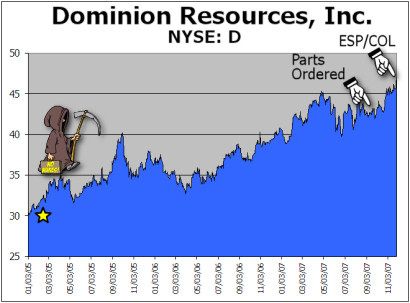In the latest in a series of announcements and newsworthy events, Dominion (NYSE: D) seems to be steadily on track to bringing high-tech, low-emission energy to Virginia.
In a press conference held at Dominion's headquarters in Richmond, Virginia yesterday, Dominion CEO Tom Farrell announced, "Dominion has taken an important step to meet Virginia's future energy needs while simultaneously protecting the environment.” And according to Dave Christian, President and Chief Nuclear Officer, "It's good news for our company, good news for Virginia, and good news for our country."
Good news, indeed!
Despite antinuclear predictions to the contrary on February 17, 2005, Dominion stock seems to be performing rather favorably. And, if investors are leery of new nuclear, then it certainly doesn't show up in the stock price.

I'm trying to imagine what form future predictions may take...
"When large parts for a new reactor are orde..." Oh, sorry. That's already happened. (See "Parts Ordered" in the graphic above.)
"When Dominion actually receives their Early Site Permi..." Oops. That's already happened too. (See "ESP/COL" above.)
"When Dominion files an application with the NRC to construct and oper..." Oops again. (See "ESP/COL" above.)
OK. So when exactly do investors start running like vegans from a luau?
I say that these investors, like the majority of Americans, see nuclear power as an investment in a clean and economical future.
What do you think?
In a press conference held at Dominion's headquarters in Richmond, Virginia yesterday, Dominion CEO Tom Farrell announced, "Dominion has taken an important step to meet Virginia's future energy needs while simultaneously protecting the environment.” And according to Dave Christian, President and Chief Nuclear Officer, "It's good news for our company, good news for Virginia, and good news for our country."
Good news, indeed!
Despite antinuclear predictions to the contrary on February 17, 2005, Dominion stock seems to be performing rather favorably. And, if investors are leery of new nuclear, then it certainly doesn't show up in the stock price.

I'm trying to imagine what form future predictions may take...
"When large parts for a new reactor are orde..." Oh, sorry. That's already happened. (See "Parts Ordered" in the graphic above.)
"When Dominion actually receives their Early Site Permi..." Oops. That's already happened too. (See "ESP/COL" above.)
"When Dominion files an application with the NRC to construct and oper..." Oops again. (See "ESP/COL" above.)
OK. So when exactly do investors start running like vegans from a luau?
I say that these investors, like the majority of Americans, see nuclear power as an investment in a clean and economical future.
What do you think?

Comments